中國民族音樂資料館 Chinese Music Archive
人物篇 - The Artists
预告篇 -人物专辑:
刘 天 华
华 彦 钧 (阿炳)
孙 文 明
查 阜 西
管 平 湖
张 子 谦
刘 少 椿
吴 景 略
姚 丙 炎
赵 松 庭
陆 春 龄
刘 明 源
汤 良 德
刘 德 海
王 范 地
安 志 順
[一] 民乐大师简介 (一)
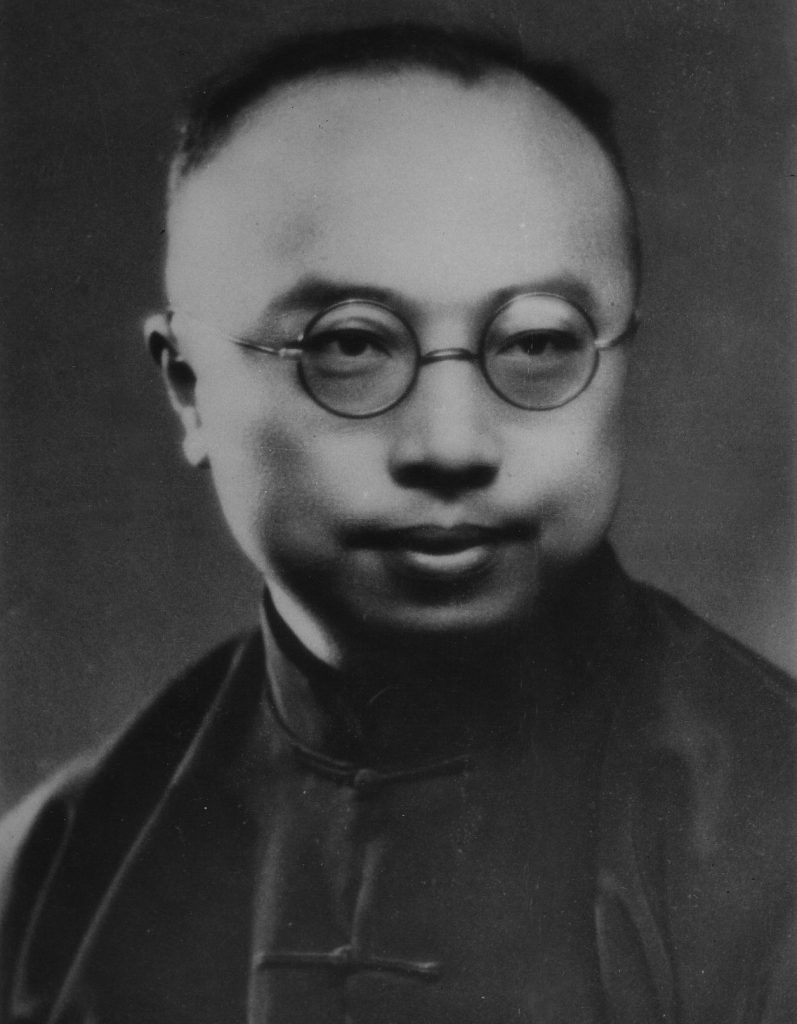
刘天华 - 民族音乐家
刘天华, 一八九五年二月四日生于江苏省江阴县城内西横街四十九号, 一九三二年六月八日晨五时二十分因患猩红热,病逝干北京, 享年三十七岁。刘先生是五四时代中国最优秀的器乐作曲家, 同时也是卓越的二胡、琵琶演奏家和音乐教师。一九一一年, 辛亥革命爆发, 离开常州中学, 由于家境贫寒, 未再升学, 返里后, 开始音乐工作, 期间除了深造原所习之军乐乐器外, 又从周少梅学习琵琶及二胡, 从沉肇洲学习琵琶, 并到河南寻师学习古琴, 于此十年间写成了二胡独奏曲《病中吟》、《月夜》、《空山鸟语》的初稿。一九二二年, 赴北京, 在北京大学音乐传习所、北平女子高等师范学校音乐系、北平艺专音乐系授课, 又从托诺夫学习小提琴, 从欧罗伯学习理论作曲, 并同时涉猎三弦拉戏。一九ニ七年, 与友创办“国乐改进社”, 编刊了《音乐杂志》, 在北京期间, 除了编写二胡和琵琶教材外, 还创作了二胡独奏曲《苦闷之驱》、《光明行》、《良宵》、《闲居吟》、《悲歌》、《独弦操》、《烛影摇红》, 及琵琶独奏曲《歌舞引》、《改进操》、《虚籁》, 和一首丝竹乐合奏曲《变体新水令》, 刘先生又为梅兰芳出访美国, 听写了梅氏演唱的京剧及昆曲唱腔, 编印成《梅兰芳歌曲谱》一巨册。刘先生以毕生的精力从事中国音乐的收集、研究、创作和教学, 通过实践, 立志改进和发展民族音乐, 以独到的见解, 反对全盘西化论, 亦反对排斥西方文化的国粹主义, 主张曲谱维新, 改进国乐使与世界音乐“并驾齐驱”, 被誉为中国用近代记谱方法搜集整理民间音乐最早的一个人, 其学生曹安和、吴伯超、萧伯青、韩权华、王君仅、陈振铎、蒋风之………等对近代中国音乐的发展均曾起到了积极的推动作用。他还搜集整理了《安次县吵子会乐谱》、《佛曲谱》等, 不过有些原始材料已经散失, 没有留传下来。可惜天嫉英才, 他在一九三二年六月一日赴北京天桥收集锣鼓谱时染上猩红热, 罹病仅一星期而谢世。今天我们只能从他的四首遗音中去揣摩了解他的音乐真谛。
LIU Tian-hua
LIU Tian-hua was born on February 4, 1895 in Jiangyin, Jiansu province and passed way of scarlet fever in Beijing on June 8, 1932. He was the great master of Chinese national music, both in composition and performance. In 1911, he returned from his school in Changzhou to Jiangyin and started his music career. He Learned the pipa and erhu from ZHOU Shao-mei and further studied the pipa from SHEN Shao-zhou. He even spent his summer holidays in Henan for studying of guqin there. In ten years’ time, he made drafts of the erhu works of Sigh of Ailment, Moonlit Night and Bird-call in the Mountain. In 1922, he came to Beijing and was successively appointed to the high-level educational units as music teacher. He started to learn the violin from Russian Professor Tonov and music theory from Professor Albert. In 1927, he founded the Association for the Advancement of Chinese Music in Beijing and published the Music Magazine. During his time in Beijing, he wrote many erhu and pipa training materials. Besides, he also composed erhu pieces Song in Desolation, March towards Brightness, New Year’s Eve, Leisure, Song of Melancholy, Monologue on a Single String, Candle Shadows Flickering Red and pipa pieces From the Opera, March for Betterment, Sound of Silence, together with an ensemble work Variations on a Traditional Tune. In 1929, he recorded MEI Lan-fang’s songs in both Chinese and European notation in the book Selections from the Reperoire of Operatic Songs and Terpsichorean Melodies of MEI Lan-fang for Mei’ s performance trip to United States. LIU Tian-hua’s hard working on Chinese music collection, researching, composing and teaching let him successfully to achieve his goal of advancement of Chinese music. Under his training, his fellow students CAO An-he, WU Bo-zhao, XIAO Bo-qing, HAN Quan-hua, WANG Jun-jin, CHEN Zhen-duo, JIANG Feng-zhi, etc. had taken important part in the development of Chinese music.
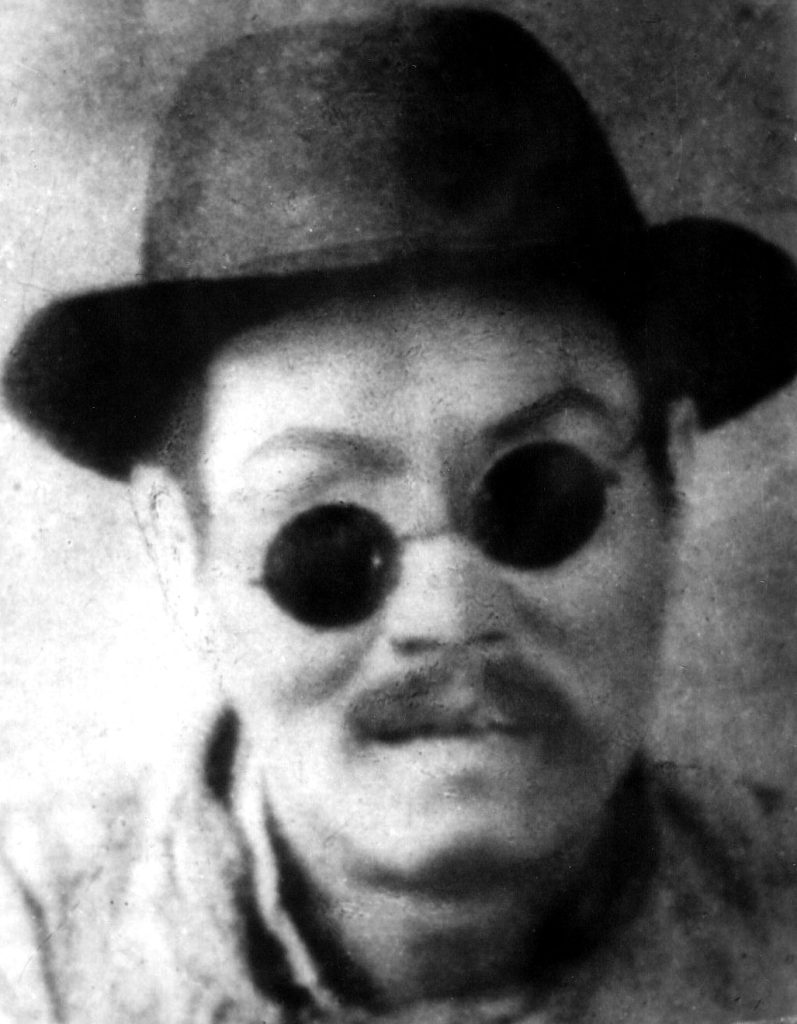
华彦钧(阿炳) - 民间音乐家
华彦钧, 一八九三年八月(癸已年七月初九日)生于江苏无锡东亭乡, 一九五○年十二月四日(庚寅年十月二十五日)与世长辞, 享年五十八岁。华度彦钧别名阿炳, 是无锡雷尊殿当家道士华清和的独生子, 华清和号雪梅, 擅长演奏多种民族乐器, 尤以琵琶为精, 阿炳自幼从父学习多种乐器, 并很快地掌握了这些乐器的性能。他四岁丧母, 二十一岁患眼疾, 逐渐恶化, 二十六、七岁时瞎了一只眼晴, 因此得不到斋主们的欢迎。三十岁离开道门, 以卖唱和演奏乐器为生。三十五岁时双目失明, 从此流浪街头, 被称为“瞎子阿炳”。一生遭遇坎坷, 但他爱僧分明, 用自己的歌喉和手中的乐器, 对社会上的邪恶势力、卑劣行为进行暴露和押击。报上的新闻他唱, 听来的新闻他也敢唱。一九二七年四月十二日, 当权派杀害了进步人士秦启, 阿炳编唱了《秦启血溅大雄宝殿》; 一九三二年, 十九路军在上海孤军抗战, 他编唱了“十九路军大刀队杀东洋鬼子像切西瓜”;一九三八年, 作恶多端的县长杨高伯被游击队击毙, 他编唱了《枪毙杨高伯》。 抗战期间他还编写过《汉奸的下场》等歌词, 抗战胜利之后, 他对国民政府的统治极为不满, 唱出了“前走狼, 后走虎, 世上猫子吃老鼠”和“金元券满天飞”的歌词, 对时政进行了无情的揭露。阿炳的器乐演奏深为当地群众喜爱, 这和他广泛学习分不开。几十年来, 他听见自己喜爱的音乐就学, 超脱了狭窄的师承保守观点, 毫不拘泥地以众人为师, 自己有所创造, 创作了一批乐曲。一九五0, 年杨荫浏先生对他进行采访时, 录下了他创作和传谱的二胡曲《二泉映月》、《听松》、《寒春风曲》及琵琶曲《大浪淘沙》、《昭君出塞》、《龙船》六首乐曲, 阿炳演奏的这些曲调来源, 通常都是一个哑谜, 无法印证出处, 都曾被假借自“梵音”, 但到目前为止也没有任何考证是与道家音乐有关, 因此, 就极可能是阿炳自己的作品。可惜正当他苦尽甜来的时候, 他所会的几百首乐曲还没有来得及录音, 便与世长辞了, 但是, 他的音乐传到了全世界, 感动了无数的听众。
HUA Yan-jun
HUA Yan-jun was born in August 1893 in Dongting, Wuxi, Jiangsu province and assed away on December 4, 1950. He was a renowned folk musician also alias Ah Bing. He was the only son of the Taoist priest HUA Qing-he alias Xue-mei, who was in charge of the Leizun Temple in Wuxi. Since his childhood, Ah Bing had been learning many instruments from his father. When Ah Bing was four years old, his mother died. When he was about twenty six or twenty seven, one of his eyes became blind, and at the age of thirty, he left the Taoist world and began to earn his living by singing and playing instruments. At the age of thirty five, he became totally blind, and people started to call him “Ah Bing the Blind”. His life was miserable, but he kept a firm moral stance. He sang the news from the press and also news that he heard from other people. After the victory of the War against Invasion, he was very disappointed by the rule of the Government, and he sang songs criticizing openly the exploitation of the people by the government and the serious problem of inflation. The instrumental performance of Ah Bing was deeply loved by the local audience. He was not restricted by the conservative attitude of following only one master. He considered many as his teachers while going on with his own composition, resulting in his many works. In 1950, when YANG Yin-liu visited him, he made recordings of six pieces of music that he composed or passed down. When people began to recognize his artistic achievements, before recording down the hundreds of works in his repertoire, he passed away unfortunately at the age of fifty eight. However, his music travels around the world and has touch the hearts of an untold number of people.
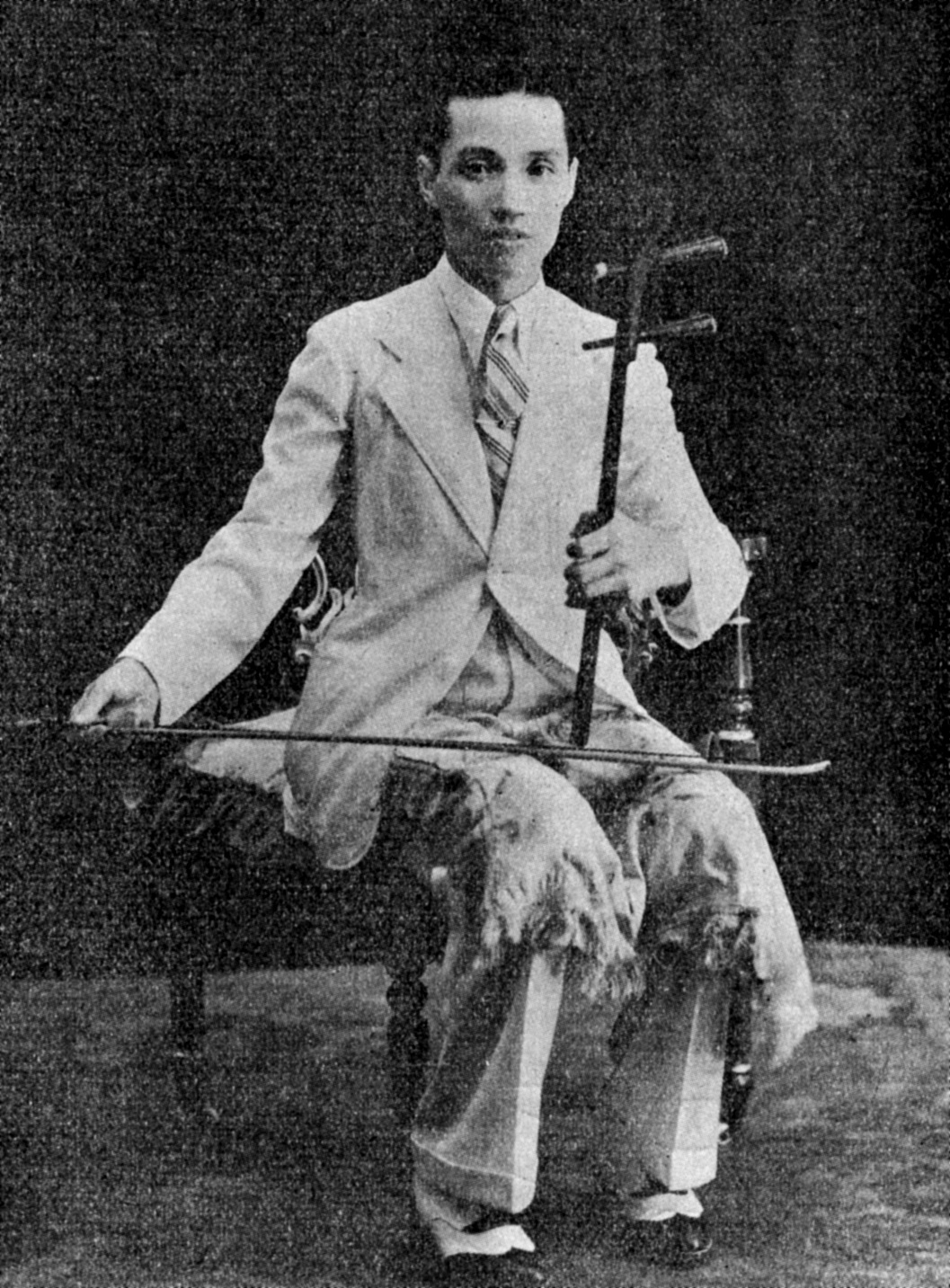
吕文成 - 粤乐宗师
吕文成, 一八九八年三月十二日出生于广东中山县石岐镇南门一清贫农家, 一九八一年八月二十二日病逝于香港。一九O一年, 随父迁居上海的粤籍移民所聚居之虹口区, 一九O八年, 免费入读广肇义学, 一九一三年, 毕业后当银匠徒工, 因性好音乐, 更嗜好胡琴与扬琴演奏, 不时得到俱乐部乐队的音乐家指导, 又与任悔初、黄咏台等丝竹及粤乐名家往还, 技艺大进, 同时, 参加上海中华音乐会及精武体育会粤乐组的各种活动, 并成为音乐导师, 声名渐著, 至二十岁时, 已有“二胡博士”之雅号。一九二六年, 得司徒梦岩启发, 将“江南二胡”创改为“粤乐二胡”;又将“七音洋琴”改制为“八音洋琴”, 其高音声部的原有铜线, 同时亦被创先以钢丝弦替代使用;其亦长于演唱粤曲“旦喉”, 自打扬琴自唱之《燕子楼》、《潇湘琴怨》及颂扬革命家秋瑾女士的《秋魂夜怨》等唱腔, 流芳于世, 经久不衰。一九二四年, 与司徒梦岩合作为“上海大中华留声机器公司”灌录了首张粤调合奏唱片《到春雷》及粤曲唱片《燕子楼》、《蒲湘琴怨》等, 蜚声海内外, 此后, 开展了粤乐的“新乐阶段”, 以改良的软弦、软弓乐器奏和小曲“联发体”的“平腔”演唱, 并渐渐地取代了原有的硬弦、硬弓乐器拍和“板腔体”的“假腔”演唱之“古乐阶段”。一九三二年“一.二八”战役后, 吕文成离开上海到香港, 继续为“新月唱片公司”从事粤乐演奏及灌录唱片之工作, 又参与香港钟声慈善社等粤乐组织之活动, 其后, 在“和声唱片公司”组织“歌声音乐团”, 以“歌林唱片”为牌号, 出版了大量的粤乐及粤曲唱片, 亦时有参与其它唱片公司之制作, 在大半个世纪的艺术生涯中, 吕氏录制的粤乐及粤曲唱片达数百张, 其创作之粤乐、粤曲等亦达百数以上。二战开始时, 香港即沦陷, 吕文成转往广州谋生, 与友组织乐队, 在广东一带之城镇巡回演奏, 二战结东后, 重返香港, 开始提倡粤语演唱流行小调, 创作大量新腔, 被誉为“粤语流行曲”之父。其一生所创作改编的粤乐作品包括《蕉石鸣琴》、《烛影摇红》、《平湖秋月》、《醒狮》、《下山虎》、《步步高》等等家喻户晓名曲百余首。
LU Wen-cheng
LU Wen-cheng was bron on March 12, 1898 in Zhongshan, Guangdong province and passed away of illness on August 22, 1981 in Hong Kong. In 1901, he moved to Shanghai with his father. In 1913, he graduated from school and started to learn music from the members of the ensemble of his working area. He then made friends and further studied with REN Hui-chu and HUANG Yong-tai in the yangqin performance. At that time, he studied hard with diligence him a fame of “Master of Erhu”. He joined the activities of the Guangdong Societies and got in Shanghai. Over there, he made friends with most of the Guangdong musicians. 1924, he and SITU Meng-yan was invited by the Shanghai Great China Record Company to record down three sets of Guangdong music and songs. In 1926, he was guided by the violinist SITU Meng-yan to transform the Jiangnan erhu into a new format which let him to invent the Guangdong erhu. Later, he continued his reformation of musical instruments on the yangqin. In 1932, he left Shanghai and moved to Hong Kong, working in the New Moon Record Company, many new pieces of Guangdong music played by him with his new invented instrument were widely spread. Around 1937, he joined the Wo Sing Record Company to continue his recording live to produce the “Columbia” label with Guangdong music records. During World War II, he moved to Guangzhou and formed an ensemble there. After the war, he came back to Hong Kong and started to compose of songs of Guangdong language which led a new stage and gain him a fame of “Father of Guangdong Songs”. Among his hundred of compositions, of songs there are some famous ones Playing the Lute by the Plantain and the Rockery, Candle Shadows Flickering Red, Autumn Moon Upon Placid Lake, Awakes Lion, Stepping High, etc.
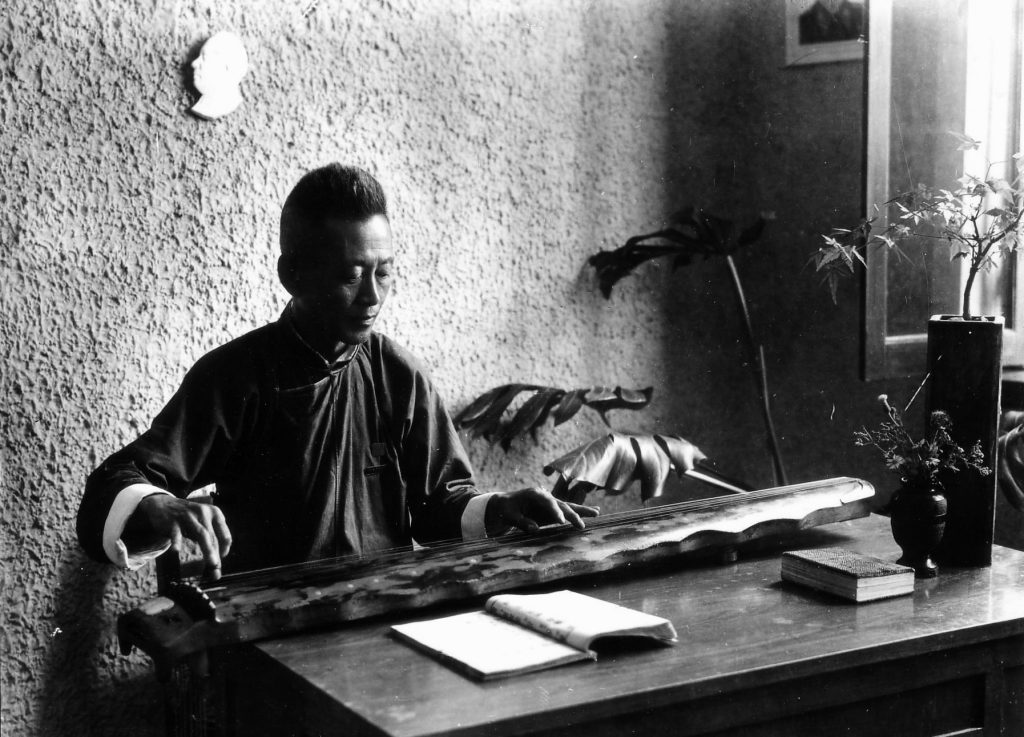
管平湖 - 琴乐发掘及整理专家、演奏家
管平湖, 一八九七年二月二日出生, 一九六七年三月二十八日卒于北京, 祖籍江苏苏州。管先生名平, 字吉庵、仲康, 号平湖, 自称门外汉, 是清代官庭如意馆画院院长及北京著名琴家俞香南学生的名画家管念慈之次子。管平湖自幼酷爱艺术, 弹琴作画皆得家传, 又从师名画家金绍城, 学花卉、人物之工笔笔法, 成为“湖社”画会之主要成员之一, 并任教于北平京华美术专科学校。其古琴艺术深得九疑派杨宗稷、武夷派悟澄老人及川派秦鹤鸣等名琴家之真传, 除博取三派之长, 又从民间音乐中汲取营养, 融会贯通, 自成一家, 达到近代中国琴坛“管派”的地位。演奏风格以朴素豪放而雄健潇洒, 含蓄蕴藉而情趣深远见称。其演奏《流水》一曲, 尤特著名, 获“管流水”之美誉, 一九七七年八月二十日, 美国发射的“航行者”号卫星, 将管氏此曲录入喷金的世界名曲唱片中, 使中国的古琴乐音首次响彻太空至今。在一九一一年, 他便参加了杨宗稷在北京创办的“九疑琴社”, 到了一九三八年, 他又与北京的琴家们组织“风声琴社”, 并经常在他家中, 一起作画、吟诗、弹琴交流技艺。一九四七年, 他与张伯驹、溥雪斋、王世里、杨葆元、郑珉中等人发起组织了“北平琴学社”, 至一九五四年, 改名“北京古琴研究会”。他曾先后在北京汉学专修馆、国乐传习所、北平国立艺术专科学校任教, 一九五二年, 应聘到中央音乐学院民族音乐研究所, 任副研究员, 从事古琴音乐教学和发掘打谱研究工作。管先生毕生精力倾注在琴乐打谱方面, 经他率先发掘整理的古谱有《广陵散》、《碣石调, 幽兰》、《离骚》、《大胡笳》、《胡第十八拍》、《秋鸿》、《欸乃》等许多著名大曲, 使这些绝响已久的古琴音乐得以重新恢复了艺术生命, 他对此项起潜振绝的雄伟工作, 做出了极为巨大的贡献, 同时, 在发掘这些古谱所遇到的指法问题, 他又作出了精心的研究, 并提出自己的真知灼见, 著成了《古指法考》一书传世, 使后学者在继承琴曲的发掘打谱上, 更能藉此获益为用。
GUAN Ping-hu
GUAN Ping-hu was born in Suzhou, Jiangsu Province. His first name was Ping, alias Ji-an, Zhong-kang and Ping-hu. However, he called himself the layman. He was born on February 2, 1897 and passed away on March 28,1967 in Beijing. He was the son of GUAN Nian-ci, a famous painter in the Qing Dynasty. Influenced by the family, he started to learn music since his childhood. He studied in depth the performing art of qin and was influenced significantly by YANG Zong-ji of the Jiu Yi School, Master Wucheng of the Wu Yi School and QIN He-ming of the Szechuan School. However, he combined the features of different schools and adopted the styles of folk music to create his own qin school of Guan. The style of the Guan school is plain and unconstrained, modest and profound. He got his fame in playing Flowing Water and this qin piece played by him was collected into the Gold CD which was brought to the universe by the U.S. spaceship Voyager launched on August 22, 1977. The charm of Chinese qin was displayed in the universe for the first time. In the early years of the Republic of China, he joined the Jiu Yi Qin Society founded by YANG Zong-ji in Beijing. In 1938, he organized with other Beijing qin artists a qin society – The Sound of Wind. His easy-going and generous character won him a lot of friends. His home became a centre for Beijing qin artists to paint and play qin and exchange experience. In 1947, together with five other artists, he founded Qin Society of Beijing. The name was changed to the Beijing Qin Research Association in 1954. He once taught in the Beijing Chinese Research School, Chinese Music School and Beijing National Arts School. In 1952, he was appointed to teach qin and transcribe ancient scores in the Traditional Music Research Institute of Central Conservatory. He spent his whole life in the playing art and the transcription work of qin. His contribution in transcription of ancient score is so great that many ancient pieces were brought to life again through his hard work. His book Study of Ancient Fingering Techniques presents his unique understanding in that field.
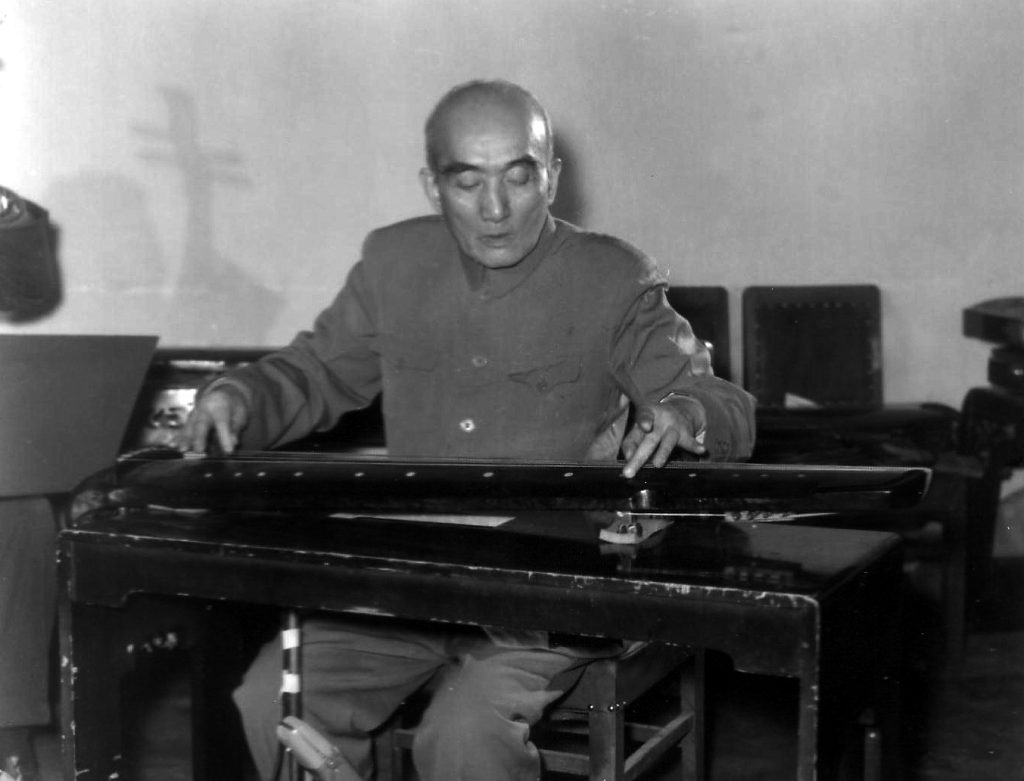
吴景略 - 琴乐教育及研究专家、演奏家
吴景略, 一九O七年二月五日生于常熟西塘, 一九八七年八月十六日病逝于北京, 祖籍江苏省常熟西塘。吴先生名韬, 别号缓更, 少时从学民族乐器于赵剑侯、周少梅、吴梦非等;一九二七年, 从天津琴家王端朴习琴, 勤奋上进, 四方求教, 博采众家之长, 自成一体, 并于一九三六年四月, 经琴家李明德介绍, 参加在苏州创立的“今虞琴社”, 一九三九年及一九五六年, 两度被选任司社之职, 主持“今虞琴社”社务, 又曾以“箫声琴韵室”之名, 在上海、常熟两地教授古琴, 先后招收了翁瘦苍、沉心工、吕振原等五十余名学生。在此期间, 据《五知斋琴谱》、《神奇秘谱》、《松弦馆琴谱》、《风宣玄品》等十余种明清古谱, 发掘整理了近四十首古代琴曲, 并创作了《胜利操》, 移植改编了《新疆好》等歌曲。自三十年代以来, 在各种音乐会上经常表演古琴独奏, 并为电台、研究单位和教学单位录制了大量的音像资料。一九五三年, 被聘为中央音乐学院民族音乐研究所通讯研究员, 一九五六年秋, 任中央音乐学院民乐系弹拨教研室主任, 专门从事古琴教学和研究工作, 为新中国培养了不少古琴演奏和研究人才。吴景略潜心琴艺, 在古琴流派中独树一帜, 被称为“虞山吴派”, 其演奏以气韵见长, 兼有北之雄奇、豪宕与宏廓, 又有南之清洞、柔婉和流丽, 落指成珍, 挥掌可范, 精热神妙, 烨烁古今。其演奏的《潇湘水云》、《普庵咒》、《渔樵问答》、《梧叶舞秋风》、《忆故人》、《阳春》、《胡茄十八拍》、《秋塞吟》、《墨子悲丝》 等早已录成唱片, 画声海内外。吴景略又对鉴琴、修琴有很丰富的经验, 并致力于古琴的改革, 一九五八年, 经反复试验, 设计, 制成改革古琴, 是在不改变古琴原有的音色, 保持传统演奏方法和尽量保留原来的民族形式的前提下, 而取得了音量扩大、消除滑指噪音等较理想的效果。一九七O年, 更成功地研制出钢丝尼龙琴弦, 成为古琴发展历程上的新里程。在文字著作上有《七弦琴教材》、《虞山琴话》 《古琴改良》等琴学论著, 吴景略尤擅演奏《渔樵问答》, 更为琴坛称道, 并获“吴渔樵”的雅号。
WU Jing-lue
WU Jing-lue was bron on February 5, 1907 in Changshou county, Jiangsu province and passed away of illness on August 16, 1987 in Beijing. His first name was Tao and other name was Man-sou. He learned traditional instruments from ZHAO Jian-hou, ZHOU Shao-mei and WU Meng-fei. In 1927, he started to learn the qin from the Tianjin qin player WANG Duan-pu. Since then he had learned from many sources and developed his own style. In April 1936, he joined the Jinyu Qin Musicians Association founded in Suzhou. From 1939 to 1956, he was appointed as Chairman, running the association in Shanghai. In autumn 1956, he was appointed as Professor of the Central Conservatory, thus focusing his strength in the teaching and researching of the art of qin. He was experienced in assessing and repairing the qin instruments. He was enthusiastic in reforming the qin. After repeated experiments, the reformed qin was designed, which inherited the timber, performing techniques and outlook of the original qin while achieving larger volume and lower noise. In 1970’s, together with the instrument factory he successfully introduced the steel-nylon string which won the appreciation of most qin players, setting up a milestone in the development history of the qin. He wote articles and publications on the qin including Teaching Text Book of Qin, Qin Arts of Yu Shan and Reformation on Guqin, etc. His performing of a Dialogue between a Fisherman and a Woodcutter won him a fame of “WU Yuqiao”.
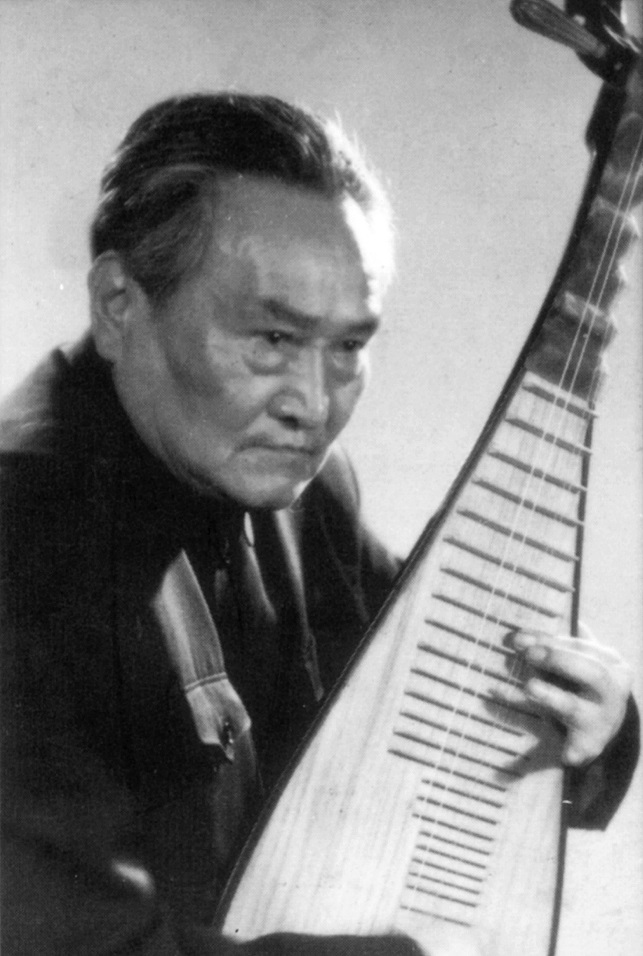
卫仲乐 - 民族乐器演奏的多面手
卫仲乐, 一九○九年三月十二日生于上海的一个码头工人家里, 一九九七年四月七日逝世于上海的病榻中, 祖籍江苏无锡。卫先生本姓殷, 过继卫姓后更名卫秉涛、卫崇福, 其后郑。文又替他改名卫伸乐。一九二六年, 因家贫得郑。文免收会费, 招为“大同乐会”会员, 并拜在郑觐文、汪昱庭、柳完章等人门下, 学习古琴、琵琶、小提琴等, 又从其他乐家学习箫、笛、二胡等民族乐器, 由于兴趣、天赋及刻苦, 加上良师的指导, 成为首屈一指的学员。一九二八年, 在上海大光明电影院落成庆典中演奏《十面埋伏》一曲, 技惊四座, 后又在“世界社”举办了第一次别开生面的多种民族乐器独奏音乐会, 揭开了中国现代音乐史上民乐独奏音乐会的第一页。一九三四年, 参加百代公司的国乐队, 结识了聂耳, 并录制了琵琶曲《塞上曲》及古琴曲《阳关三叠》等, 聂耳亦特为之报题。其后, 由于郑觐文的辞世, 卫仲乐便于一九三五年接替了“大同乐会”乐务主任之职, 并应俄国作曲家阿隆, 阿南夏洛穆夫所指挥, 由辛格独奏的阿氏以中国音乐素材创作的钢琴协奏曲第二乐章, 组成民乐队作协奏, 成为中国历史上第一次用民族乐队为钢琴协奏。一九三六年, 阿隆特为卫仲乐创作了《杨贵妃之死》二胡套曲在兰心戏院公演, 由卫件乐二胡独奏, 工部局交响乐队伴奏。一九三七年, 卫伸乐常在南京中央广播电台、上海广播电台、美国新闻处电台、英国民主电台、法国电台和苏联呼声电台任音乐演奏员, 经常介绍刘天华的二胡曲和琵琶曲。一九三八年随中国文化剧团赴美国演出, 颇获盛誉, 又于一九三九年结东访美前应当地的唱片公司邀请, 录制了数张唱片。一九四一年创办中国管弦乐队及伸乐音乐馆, 并在沪江、交通、同济和上海美术专科学校等大专院校教授国乐。新中国成立后随“中国文化代表团”出访印度、缅甸、印度尼西亚等国;除任教于上海音乐学院外, 还受托筹建该院民乐系, 初任副主任, 一九五八年升为系主任, 一九八五年改任名誉系主任。他毕生致力音乐教育事业, 学生桃李满天下。
WEI Chung-loh
WEI Chung-loh is a contemporary instrumentalist of Chinese music. He was born in Shanghai on March 23, 1908 and passed away of illness on April 7, 1997 in Shanghai. His ancestral home was in Wuxi, Jiangsu province. His last name originally named YIN and the first names were Bing-tao and Chong-fu. ZHENG Jin-wen gave him the name of WEI Chung-loh. In 1928, he joined the influential “Ta Tung National Music Research Institute”. There he learned many instruments including qin, pipa, erhu, jinghu, sanxian, xiao, bamboo flute and violin from ZHENG Jin-wen, WANG Yu-ting, LIU Yao-zhang and other famous players. His musicianship became so mature that he was appointed the Associate Music Director of the institute. In 1938, he was involved in many charity concerts in Hong Kong and in United States to raise money for Chinese refugees. The American critics called him “Kreisler on the pipa”. He also became “The first Chinese person to appear on American TV”. In 1939, he made 4 records before he left the States. In 1941, the member of “Ta Tung” became scattered, but this did not stop him from forming music societies and ensembles and teaching students. In 1949, the People’s Republic of China was established. Shanghai Conservatory employed him to teach Chinese music. In 1956, he became Associate Department Head of the Chinese Music Depart of Shanghai Conservatory. He became Department Head in 1958, and in 1985 he became Honorary Department Head.
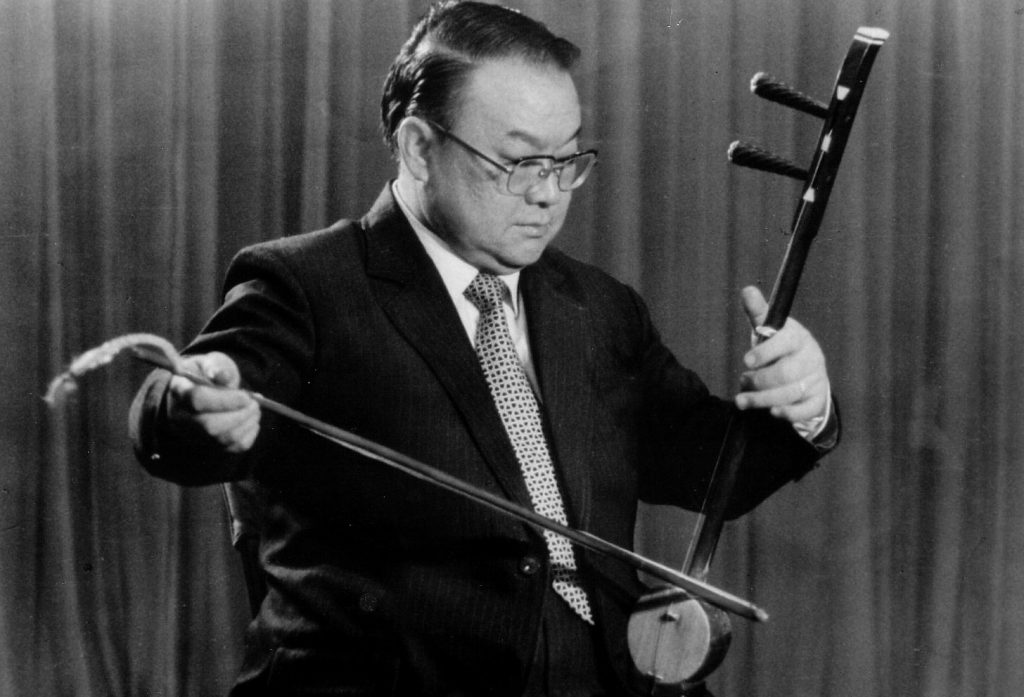
刘明源 - 中国弓弦乐之神手
刘明源, 一九三一年七月十三日(农历五月二十八日)生于天津市红桥区北营门外米家胡同三号, 一九九六年二月二十一日病逝于北京。五岁从父亲学习板胡和京胡, 七岁登上天津中国大戏院舞台, 演奏京胡《夜深沉》及广东音乐《步步高》, 十一岁参加天津的“百灵社”、“八音乐社”及“闻粤会馆”等国乐社团, 学习及演奏国乐曲、丝竹音乐、广东音乐、京戏、评戏、河北梆子等。一九四七至一九五一年, 在天津胜利、皇官、永安、惠中等歌舞团任乐队队员。一九五二年, 应北京电影制片厂音乐科之邀, 参加电影《龙须沟》的音乐录音, 极获好评, 与其他六人随即为电影厂调职留用, 成为新中国国家电影乐团的首批专业民族音乐工作者, 一九五三年时, 改组为中国中央新闻电影纪录制片厂乐团, 刘明源成为廿八人组成的专业民族乐队的首席及独奏演员, 并历任乐队副队长、队长、艺委等职。一九五七年以中国青年艺术家代表身份赴前苏联, 参加第六届世界青年联欢节民间乐器演奏比赛, 演奏《大起板》、《大姑娘美》及《草原上》, 荣获金质奖章。一九五八年起创作了《喜洋洋》、《幸福年》等民族器乐合奏精品, 风蜚海内外, 刘明源擅长演奏弓弦乐器, 板胡、二胡、中胡、京胡、高胡、四胡、坠胡、马头琴等无所不精, 赢得了“胡琴司令”的美誉, 除了胡琴之外, 刘明源还学会弹钢琴, 曾担任过爵士钢琴师;同时, 亦曾拜师学习蒙古歌谣, 对蒙古音乐风格颇能掌握。刘明源致力于发展中国的弓弦乐器:曾改革研制了高音和中音板胡, 又创制了中胡, 并创作和改编有《喜车红马运粮忙》、《丰收乐》、《马车在田野上奔驰》等板胡曲, 《草原上》等中胡曲及《喜洋洋》等民乐合奏曲, 风摩全国, 深受听众的普遍欢迎。一九八二年起, 调任中国音乐学院器乐系教授, 把主要精力投入在教学上, 又与他人合作著述了板胡专著《板胡基本功训练》, 在他指导下, 一批青年演奏家脱颖而出, 均能在国内及国际的民乐大赛中荣获大奖。刘明源所作出的贡献献, 是继刘天华、阿炳之后又一位具有代表性的民族引弦乐大师。
LIU Ming-yuan
LIU Ming-yuan was born on July 13, 1931 in Tianjin, Hebei province and passed away of illness on February 21, 1996 in Beijing. His father, who worked as a doctor, was also a lover of traditional Chinese music and drama. Influenced by his father, LIU Ming-yuan started to learn the banhu and Beijing opera of five. He gave his first stage performance at the age of seven. When he was eleven, he joined the performing activities of some Chinese music groups in Tianjin, thus having the opportunity of listening to and learning from various musicians for different kinds of Chinese music. In between 1947 to 1951, he at the age joined the ensembles of Song and Dance Troupes in Tianjin. In 1952, he worked as instrumentalist and orchestrator in a Tianjin drama group. In November that year, he and other six Chinese musicians were invited to participate in the music recording of a film by the orchestra of a film company. Their performance was so good that they were invited to stay and become members of the orchestra. Since 1953 when the first professional Chinese orchestra in China was established with twenty eight members by a film company, he had been serving that orchestra as soloist and leader. Over the thirty years, he had been involved in the production of music for nearly a thousand films. In 1957, LIU Ming-yuan joined the traditional instrumental competition in the 6th World Youth Festival and won a gold medal. Since 1958, he composed, arranged and performed many pieces of Chinese light music. Through many years of persistent practice and learning, LIU Ming-yuan zhuihu and matouqin. He created a unique performing style of his own and was given a fame of “Commander mastered many Chinese bow string instruments including the banhu, erhu, gaohu, jinghu, sihu, of Huqin”. Regarding the reform of instrumenmts, he contributed in the unification of structure and improvement of tone quality of the instrumental family consisting of banhu, erhu, gaohu and zhonghu. The pieces of music performed by him on the banhu and those composed by him for the zhonghu and the erhu were very well received by the audience, and had inspired many to become professional Chinese musicians. In 1982, he started to teach in China Conservatory and concentrated his major efforts in teaching. Under his guidance, some young soloists won awards in international Chinese music competitions. He became a representative figure among the Chinese bow string masters after LIU Tian-hua and Ah Bing.
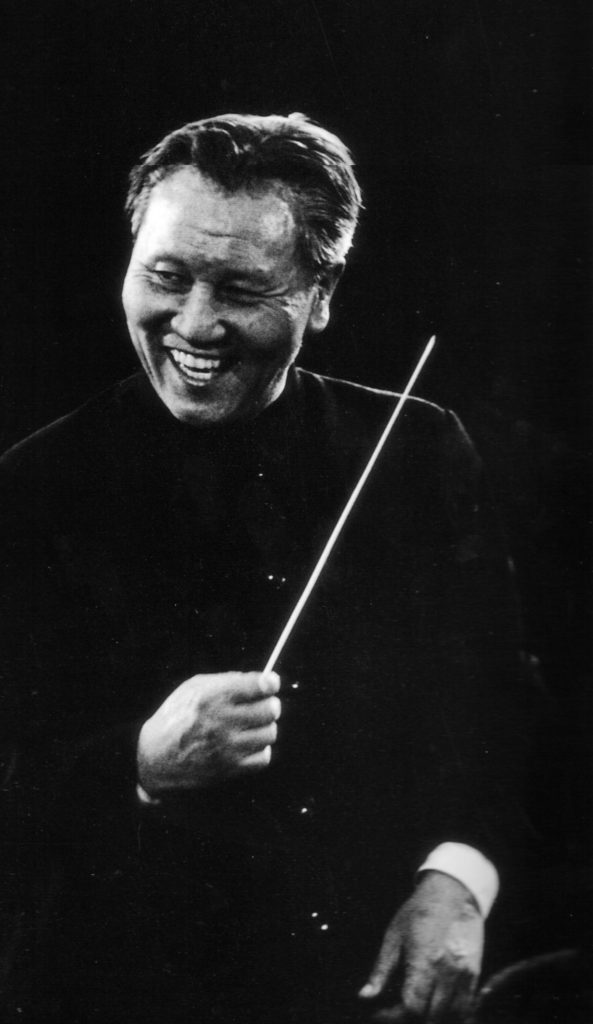
彭修文 - 中国民族管弦乐之先驱
彭修文, 一九三一年二月七日(农历庚午年十二月二十日)生于湖北省汉口市, 一九九六年十二月二十八日因患肝疾, 病逝于北京, 享年六十六岁。由于父兄等对京剧、汉剧及丝竹乐等均有所好, 故其少年时代已漫染于乐声中。一九三七年丧父后, 适值抗日战争爆发, 举家迁往四川重庆, 在五叔指导下习奏二胡, 又从刘泽隆习琵琶, 从何轶群习小提琴。一九四四年, 小学毕业后, 就读四川江津县国立九中, 得该校教师, 著名二胡教育家瞿安华悉心指导, 二胡技艺得以日臻成熟。一九四六年, 得刘泽隆及夏治操之助, 与学友赵光华、古先勋等每周往国际广播电台国乐队参加演奏, 广泛接触到各类乐曲。新中国成立后, 得西南人民广播电台(后易名为重庆人民广播电台)台长邵子南之邀, 于一九五0年三月二日正式在该电台文艺组任演奏、管理、编辑等工作, 在日后的两年多期间, 接触到大量中西音乐作品及民族民间音乐。一九五二年九月, 随电台国乐组部分人员调北京中央人民广播电台组建国乐团。一九五三年四月, 中央广播文工团正式成立, 彭氏任该团民间音乐整理小组组长, 并担任演奏工作, 一九五四年的元旦演出, 由彭修文试掌指挥, 并获得成功, 同年冬, 获与曾寻同为该团责任指挥。其后, 开始对乐队及乐器进行积极的培训与改革, 并创作、改编了大量的民族器乐曲, 于此四十年间, 经其创作、改编、移植、配器的大、小、古、今、中、外乐曲达四百余首(部)。早在一九五七年的第六届世界青年联欢节上, 彭修文改编的《春江花月夜》、《金蛇狂舞》及《关山月》, 被评为是联欢节演出中的最佳节目, 而获得了金奖。在创作方面, 他的交响诗《流水操》及《怀》, 在一九八三年全国民族器乐作品创作评奖中, 分别获得一等奖与三等奖。无论是早年改编的《瑶族舞曲》、《陕北组曲》, 中期移植的《四小天鹅舞》《美丽的梭罗河》, 及后来创作的《秦.兵马俑幻想曲》、大型套曲《十二月》、二胡协奏曲《不屈的苏武》等等, 都能展现出彭修文对中国民族管弦乐所作出的具体经验, 从乐器改革与乐队培训中都能体现其成果, 并且起到了积极的作用及深远的影响, 他毕生的精力、卓知远见及大胆创新, 为中国民族音乐谱写出辉煌的乐章!
PENG Xiu-wen
PENG Xiu-wen was born on February 7,1931 in Hankou, Hubei province and passed away of illness on December 28, 1996 in Beijing. His father and brothers were keen on Peking opera, Hubei opera and their music which affected him very much. During the Sino-Japanese War started in 1937, his family moved to Chongqing, Sichuan province. He began to learn the erhu with his uncle, the pipa with LIU Ze-long and the violin with HE Yi-qun. In 1944, he further studied the erhu with JU An-hua who was the teacher of his middle school. In 1946, he and his classmates ZHAO Guang-hua and GU Xian-xun joined the International Broadcasting Station’ s Ensemble once a week where he could widely approach various kinds of music. On March 2, 1950, he was invited to join the arts group of the People’s Broadcasting Station as performer and also took responsibilities as management and edition. Over there, he kept in touching with the massive of Western and Chinese music materials. In 1952, he was transferred to the Central People’s Broadcasting Station in Beijing for setting up the traditional orchestra of the station. In 1953, the Central Broadcasting Chinese Orchestra was officially established. PENG Xiu-wen was appointed as the group leader of the folk music section. In 1954, he conducted the orchestra in the New Year’s Day Programme successfully. Later by the end of that year, he and ZENG Xun was appointed as responsibility conductor of the orchestra. He then began to reform the orchestra as well as the instruments and composed or transcribed over four hundreds pieces of Western and Chinese music for performance. Many of his works won prizes in various competitions. His hard working in training the orchestra and composing in symphonic ways of Chinese pieces wrote down an important page in the Chinese music history.
